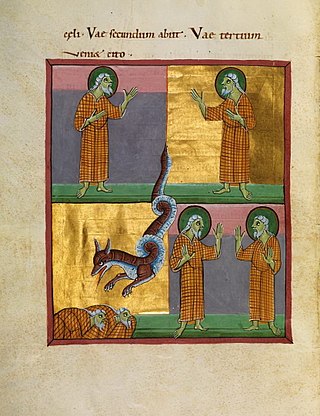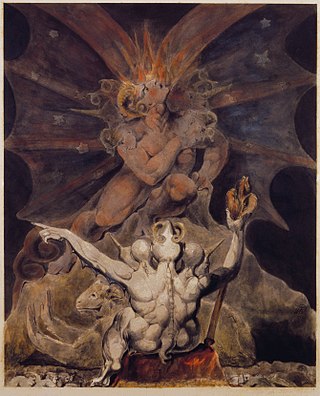Related Research Articles

The Book of Revelation, also erroneously called the Book of Revelations, is the final book of the New Testament. Its title is derived from the first word of the Koine Greek text: apokalypsis, meaning "unveiling" or "revelation". The Book of Revelation is the only apocalyptic book in the New Testament canon. It occupies a central place in Christian eschatology.

Christian eschatology, a major branch of study within Christian theology, deals with "last things". Such eschatology – the word derives from two Greek roots meaning "last" (ἔσχατος) and "study" (-λογία) – involves the study of "end things", whether of the end of an individual life, of the end of the age, of the end of the world, or of the nature of the Kingdom of God. Broadly speaking, Christian eschatology focuses on the ultimate destiny of individual souls and of the entire created order, based primarily upon biblical texts within the Old and New Testaments.

Preterism, a Christian eschatological view, interprets some or all prophecies of the Bible as events which have already happened. This school of thought interprets the Book of Daniel as referring to events that happened from the 7th century BC until the first century AD, while seeing the prophecies of the Book of Revelation as events that happened in the first century AD. Preterism holds that Ancient Israel finds its continuation or fulfillment in the Christian church at the destruction of Jerusalem in AD 70.

Apocalypse is a literary genre in which a supernatural being reveals cosmic mysteries or the future to a human intermediary. The means of mediation include dreams, visions and heavenly journeys, and they typically feature symbolic imagery drawn from the Hebrew Bible, cosmological and (pessimistic) historical surveys, the division of time into periods, esoteric numerology, and claims of ecstasy and inspiration. Almost all are written under pseudonyms, claiming as author a venerated hero from previous centuries, as with Book of Daniel, composed during the 2nd century BCE but bearing the name of the legendary Daniel.
In Christian eschatology, postmillennialism, or postmillenarianism, is an interpretation of chapter 20 of the Book of Revelation which sees Christ's second coming as occurring after the "Millennium", a Golden Age in which Christian ethics prosper. The term subsumes several similar views of the end times, and it stands in contrast to premillennialism and, to a lesser extent, amillennialism.
Premillennialism, in Christian eschatology, is the belief that Jesus will physically return to the Earth before the Millennium, heralding a literal thousand-year golden age of peace. Premillennialism is based upon a literal interpretation of Revelation 20:1–6 in the New Testament, which describes Jesus's reign in a period of a thousand years.

Amillennialism or amillenarism is a chillegoristic eschatological position in Christianity which holds that there will be no millennial reign of the righteous on Earth. This view contrasts with both postmillennial and, especially, with premillennial interpretations of Revelation 20 and various other prophetic and eschatological passages of the Bible.

Postliberal theology is a Christian theological movement that focuses on a narrative presentation of the Christian faith as regulative for the development of a coherent systematic theology. Thus, Christianity is an overarching story, with its own embedded culture, grammar, and practices, which can be understood only with reference to Christianity's own internal logic.

The historical-grammatical method is a modern Christian hermeneutical method that strives to discover the biblical authors' original intended meaning in the text. According to the historical-grammatical method, if based on an analysis of the grammatical style of a passage, it appears that the author intended to convey an account of events that actually happened, then the text should be taken as representing history; passages should only be interpreted symbolically, poetically, or allegorically if to the best of our understanding, that is what the writer intended to convey to the original audience. It is the primary method of interpretation for many conservative Protestant exegetes who reject the historical-critical method to various degrees, in contrast to the overwhelming reliance on historical-critical interpretation in biblical studies at the academic level.
Bernard L. Ramm was a Baptist theologian and apologist within the broad evangelical tradition. He wrote prolifically on topics concerned with biblical hermeneutics, religion and science, Christology, and apologetics. The hermeneutical principles presented in his 1956 book Protestant Biblical Interpretation influenced a wide spectrum of Baptist theologians. During the 1970s he was widely regarded as a leading evangelical theologian as well known as Carl F.H. Henry. His equally celebrated and criticized 1954 book The Christian View of Science and Scripture was the theme of a 1979 issue of the Journal of the American Scientific Affiliation, while a 1990 issue of Baylor University's Perspectives in Religious Studies was devoted to Ramm's views on theology.
Futurism is a Christian eschatological view that interprets portions of the Book of Revelation, the Book of Ezekiel, and the Book of Daniel as future events in a literal, physical, apocalyptic, and global context.

The Seventh-day Adventist Church holds a unique system of eschatological beliefs. Adventist eschatology, which is based on a historicist interpretation of prophecy, is characterised principally by the premillennial Second Coming of Christ. Traditionally, the church has taught that the Second Coming will be preceded by a global crisis with the Sabbath as a central issue. At Jesus' return, the righteous will be taken to heaven for one thousand years. After the millennium the unsaved cease to exist as they will be punished by annihilation while the saved will live on a recreated Earth for eternity.

In the Book of Revelation, the two witnesses are two prophets who are mentioned in Revelation 11:1-14. Christian eschatology interprets this as two people, two groups of people, or two concepts. Some believe they are Enoch and Elijah, as in the Gospel of Nicodemus, since they are the only two that did not see death as required by the Scriptures. Others believe them to be Moses and Elijah because they appeared during the transfiguration of Jesus, or because Enoch was not Abraham's descendant. Some also believe that they are Moses and Elijah due to the description of what they are to do. They have the power to shut the heavens (Elijah) and turn water into blood (Moses)

The number of the beast is associated with the Beast of Revelation in chapter 13, verse 18 of the Book of Revelation. In most manuscripts of the New Testament and in English translations of the Bible, the number of the beast is six hundred sixty-six or χξϛ. Papyrus 115, as well as other ancient sources like Codex Ephraemi Rescriptus, give the number of the beast as χιϛ or χιϲ, transliterable in Arabic numerals as 616, not 666; critical editions of the Greek text, such as the Novum Testamentum Graece, note χιϛ as a variant.

The four kingdoms of Daniel are four kingdoms which, according to the Book of Daniel, precede the "end-times" and the "Kingdom of God".

The "three angels' messages" is an interpretation of the messages given by three angels in Revelation 14:6–12. The Seventh-day Adventist church teaches that these messages are given to prepare the world for the second coming of Jesus Christ, and sees them as a central part of its own mission.

The Beast may refer to one of two beasts described in the Book of Revelation.
Francisco Ribera (1537–1591) was a Spanish Jesuit theologian, identified with the Futurist Christian eschatological view.
The Liberation of Theology (1976) is a book on theology written by Juan Luis Segundo, S.J., translated by John Drury, and published by Orbis Books.

The Kingdom of God is one of the key elements of the teachings of Jesus in the New Testament. Drawing on Old Testament teachings, the Christian characterization of the relationship between God and humanity inherently involves the notion of the Kingship of God. The Old Testament refers to "God the Judge of all" and the notion that all humans will eventually "be judged" is an essential element of Christian teachings. Building on a number of New Testament passages, the Nicene Creed indicates that the task of judgment is assigned to Jesus.
References
- ↑ "Idealist Commentaries on Revelation". Reformed Books Online. 2016-10-30. Retrieved 2022-11-08.
- ↑ Stan Campbell and James S. Bell (2001). The Complete Idiot's Guide to the Book of Revelation. Alpha Books. pp. 212–213. ISBN 9780028642383.
- ↑ Waldron, Sam (2013-02-25). "A Redemptive-Historical, Modified Idealist Approach to the Book of Revelation". Covenant Baptist Theological Seminary. Retrieved 2022-11-18.
- ↑ Mounce, Robert H. (1998). The Book of Revelation. Wm. B. Eerdmans Publishing. ISBN 978-0-8028-2537-7.
- ↑ Encyclopedia of time By Samuel L. Macey, p.186-187
- ↑ Karl Barth and Christian Unity - The Influence of the Barthian Movement Upon the Churches of the World, by Professor Adolf Keller, p.190-192
- ↑ Third Way magazine, April 1987, p.23
- ↑ Who rides the beast?: prophetic rivalry and the rhetoric of crisis in the churches of the apocalypse By Paul Brooks Duff, p. 70, Oxford UP 2001
- ↑ Christopher R. Smith, "Reclaiming the Social Justice Message of Revelation: Materialism, Imperialism and Divine Judgement in Revelation 18", Transformation 7 (1990): 28-33
- ↑ Christoyannopoulos, Alexandre (2010). Christian Anarchism: A Political Commentary on the Gospel. Exeter: Imprint Academic. pp. 123–126.
Revelation
- ↑ The Concise Dictionary of Christian Theology By Millard J. Erickson, p. 95
- ↑ Eschatology. Indexes: the concluding volume of the series Dogmatic theology By Francis Joseph Hall, p.13.